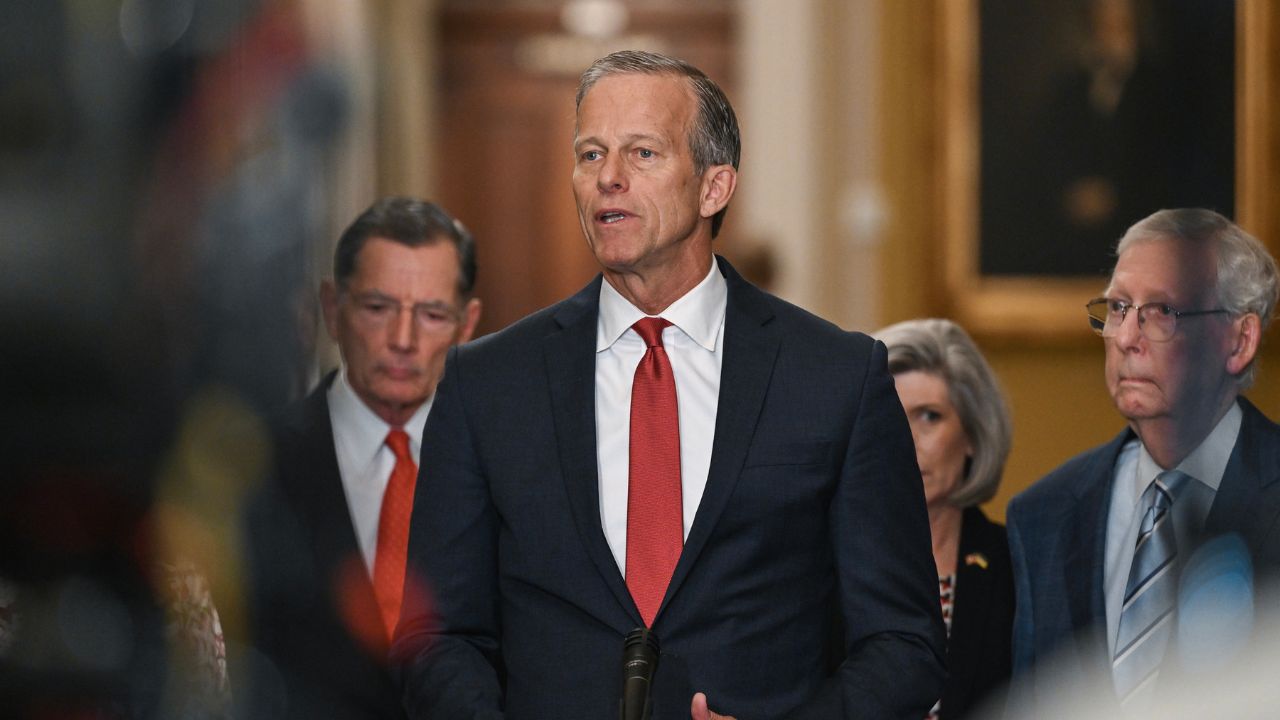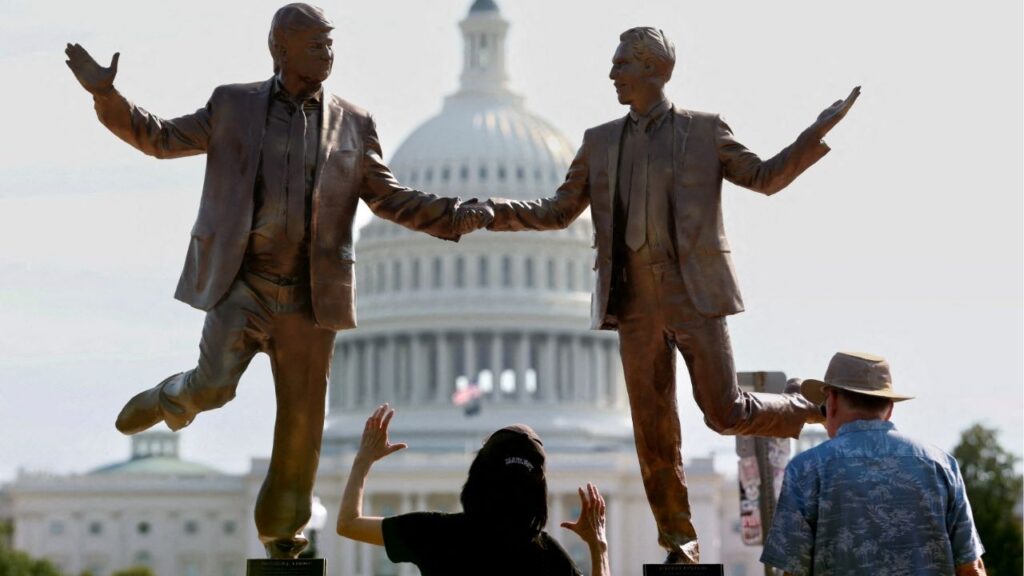Sen. John Thune (R-S.D.) during a weekly news conference on Capitol Hill in Washington, April 9, 2024. One of Thune’s first challenges as majority leader will be to shepherd multiple Trump nominees to confirmation in the closely divided Senate. (Kenny Holston/The New York Times)

- John Thune becomes Senate majority leader, tasked with managing Trump's demands, GOP senators' priorities, and a challenging legislative agenda.
- Thune rebuilt credibility after tough battles, including saving Ellsworth Air Force Base and proving leadership during McConnell’s health absence.
- Trump’s relationship with Thune remains cautious; past criticisms linger despite efforts to repair ties and forge a working partnership.
Share
|
Getting your Trinity Audio player ready...
|
WASHINGTON — John Thune won election to the Senate in 2004 by conquering Sen. Tom Daschle, the powerful Democratic majority leader, only to quickly face a mortal threat to his political future when a major Air Force base in his state was threatened with closure.
He beat back the effort and saved Ellsworth Air Force Base, a financial engine in his largely rural state, keeping his job and learning valuable lessons that have helped power his rise in the Senate.
Now the South Dakota Republican has ascended to the top and will become majority leader in the new Congress that convenes Friday, but he is again facing an early challenge and a major threat to his political standing.
Thune to Juggle President-Elect Trump’s Demands
Thune’s task this time is to juggle President-elect Donald Trump’s demands, the competing desires of 53 GOP senators and a formidable legislative agenda. It starts with shepherding multiple baggage-laden Trump nominees to confirmation in the closely divided Senate, where he can afford to lose no more than three Republican votes if Democrats hold together in opposition.
At the same time, he intends to use a tricky maneuver to steer around a filibuster and pass a combination border security, military spending and energy production bill that will require serious legislative finesse. And he wants to do it in the first month or so, while also reordering how and how often the Senate works.
It is a tall order for the 6-foot 4-inch former all-state basketball player, a crack shot who is passionate about pheasant hunting and who turns 64 in a few days.
“Lets just say he’s got a lot of interests to balance to cement his credibility,” said Sen. Kevin Cramer, a Republican from bordering North Dakota who endorsed Thune for leader, noting that his colleague had never lied to him.
Those in Thune’s orbit say a stinging defeat in a 2002 Senate bid, the momentous campaign against Daschle two years later and then the battle to save Ellsworth toughened and educated Thune about political realities. But he had already exhibited a pronounced aversion to losing during his days playing basketball for the high school team in his tiny hometown, Murdo, South Dakota, and later at Biola University, a private Christian college in California.
“It was just absolutely insane how competitive he was,” said his younger brother, Tim, who shared a bedroom with him in their 800-square-foot home and shot baskets on the hard-packed dirt court in their yard. “He always wanted the ball. When it was clutch time, he wanted the ball.”
Thune seriously considered but dropped the idea of running for president in 2012, and then contemplated retiring from the Senate in 2022. But at the urging of Sen. Mitch McConnell, R-Ky., the outgoing party leader, and the lure of a future vacancy when McConnell stepped aside, Thune decided to stick around, saying he was willing to continue doing the work “even when it was hard, uncomfortable or unpopular.”
Despite his decision to remain, he was no lock to replace McConnell after his 18-year run as leader, and faced a tough challenge from Sen. John Cornyn, R-Texas. Cornyn, like Thune, served as McConnell’s No. 2 for a stretch and was considered to have sharper political skills.
Thune Had a Test Run When McConnell Was Absent
But Thune got a bit of a test run at the top when McConnell was absent with health issues in 2023, and his colleagues liked what they saw. He spent months raising money, campaigning for Senate candidates and promising to be a consensus builder, offering an approach different from McConnell’s top-down, insular leadership style. He won the race on the second ballot in a result interpreted by many as a sign that Senate Republicans wanted a leader willing to keep at least some distance from Trump.
The person Thune might find hardest to please is Trump, who was agitated by Thune’s past criticism of his conduct and incensed that the Senate’s No. 2 Republican did not back his challenge to the 2020 election outcome and voted to certify the results. (Thune himself chose not to contest his 2002 Senate loss by just over 500 votes, saying it would be divisive for the state.)
Trump pushed — unsuccessfully — for a primary challenge to Thune in 2022 and branded him a RINO, the “Republican in name only” slur that is the gravest of insults in MAGA world. Thune, in turn, endorsed Sen. Tim Scott of South Carolina in the Republican presidential primary, although he got on board with Trump after he secured the nomination.
Steps to Repair Relations with Trump
He has since taken steps to repair relations with Trump, including making a pilgrimage to Mar-a-Lago, the president-elect’s estate and private resort in Florida. The pair seem to have settled into a working relationship after Trump stayed out of the leadership race despite a push by some of his advisers to try to block Thune. Plus, Trump has come to recognize Thune’s advantages, Cramer said.
“I’ve talked to Trump a few times since John was elected leader,” Cramer said. “He likes him a lot. He likes his articulation. He likes how he looks on TV. I think he sees him as a bit of a surprise asset.”
Still, keeping Trump satisfied will be an endless job. Earlier this week, the president-elect warned Senate Republicans not to allow Democrats to gum up the confirmation works.
“REPUBLICANS, BE SMART AND TOUGH!!!” Trump, who has little patience for, or understanding of, the complexities of congressional process, urged on his social media site.
Thune has made significant promises about how the Senate will conduct itself on his watch, pledging that senators will work a full week in contrast to recent years spent working Monday evenings through Thursday afternoon. He said he also intended to bring more bills to the floor and allow amendment fights when recent leaders of both parties have sought to limit political exposure by limiting the number of votes senators have to take.
New leaders in Congress often say they will restore “regular order,” only to abandon the pledge once it becomes politically treacherous and sparks grumbling from colleagues who want to get out of the Capitol for fundraising travel. Thune seems determined to stick to his guns.
“One thing I can tell you about next year is that it’s going to be different,” Thune told reporters in December. “The way the Senate operates today is not the way it’s going to be operating in the future. We aim to fix that. And it’s time, high time, that we start getting the American people’s work done.”
—
This article originally appeared in The New York Times.
By Carl Hulse/Kenny Holston
c. 2025 The New York Times Company
RELATED TOPICS:
Categories

Three ‘Little Pigs’ Held by Sanger Police


















